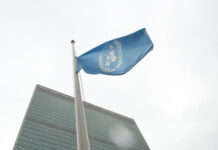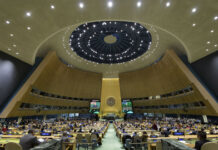Photo credit: DiasporaEngager (www.DiasporaEngager.com).
Joint Statement by the Principals of the UN Steering Group on Solutions to Internal Displacement: DCO, IOM, OCHA, UNDP, UNDPO, UNDPPA, UNICEF and UNHCR
New York/ Geneva – Two years after the launch of the UN Secretary-General’s Action Agenda on Internal Displacement, there has been significant progress towards its common vision and objectives. As members of the UN Steering Group on Solutions to Internal Displacement, we are committed to build on the momentum which has been achieved. However, internal displacement remains an issue deserving urgent attention, and much more remains to be done to support the almost 76 million people currently internally displaced worldwide.
The Action Agenda was the Secretary-General’s response to the High-Level Panel on Internal Displacement, which was requested by 57 member states. It called for a change in approach, recognizing solutions to internal displacement as a development priority in which national ownership is critical, and for greater engagement of development, peace and climate actors. The Secretary-General appointed a Special Adviser on Solutions to Internal Displacement to coordinate the Action Agenda and mobilize stronger, one-UN approaches to enhance prevention, response and solutions to internal displacement. Two years on, we can see the difference on several fronts, most strikingly in government leadership.
We have worked closely with national and local authorities committed to finding solutions to internal displacement in 15 affected pilot countries. We have placed emphasis on whole-of-society and people-centered processes, recognizing that people should have a say in determining their own futures. We have seen a new generation of Government-owned displacement solutions strategies emerge, anchored in development approaches. The Governments of Nigeria, Iraq, Somalia, Colombia, Libya and Ethiopia (Somali Region) have collectively committed to place 8.5 million internally displaced persons and recent returnees on solutions pathways. Going forward, we will continue to support Governments to design and implement solutions pathways which protect and uphold international human rights standards.
Internal displacement is now more visible on the international development and peace agendas, for example featuring on the World Bank corporate results scorecard for the first time, and at the World Bank Fragility Forum in 2024. In climate action, internal displacement was prominent at COP28, and the historic Loss and Damages Fund includes displacement in its scope of operationalization.
Within the UN, we have strengthened resources to support Governments in their solutions work. A UN Solutions Fund has been established, offering catalytic funding to support Government solutions efforts. Across the pilot countries, UN agencies within the Steering Group and beyond have collectively supported Governments, under the direction of Resident Coordinators as the UN lead on solutions at the country-level. The IASC Review of the humanitarian response to internal displacement has been completed and will result in measures to improve assistance to and protection of IDPs, and to better lay the foundations for solutions, facilitating more coherent action between humanitarian and development actors.
While these are great strides, there is much still left to do. Year after year internal displacement figures continue to break records; when the Action Agenda was launched, there were 59 million internally displaced worldwide – today there are close to 76 million. At the end of 2023, there were 9.1 million
displaced people within Sudan, the highest number ever recorded in one country. Stepped-up action on prevention is critical to reverse this trend, and to ensure that internal displacement is more firmly anchored in the final push to the 2030 Agenda for Sustainable Development. A dedicated Forum of some kind for Member States and other key stakeholders to hold ongoing dialogue on internal displacement, and to collectively take stock of progress and drive joint priorities, is still required. The need for development financing, of the type and scale required to realize solutions on the ground, remains unmet.
On its second anniversary, the vision and commitments in the Secretary General’s Action Agenda are as pressing as ever to lift millions out of displacement and prevent further displacement. While we have seen progress, this only represents the beginning of a process of change to be sustained. Beyond 2024, when the mandate of the Special Adviser will come to an end, Steering Group members will ensure that we do not lose the gains we have achieved over the past 2 years, most importantly for the millions who remain internally displaced people worldwide.
Signed by:
– Amy Pope, Director General, International Organization for Migration
– Martin Griffiths, Under-Secretary-General for Humanitarian Affairs and Emergency Relief Coordinator, Office for the Coordination of Humanitarian Affairs
– Achim Steiner, Administrator, United Nations Development Programme
– Jean-Pierre François Renaud Lacroix, Under-Secretary-General for Peace Operations, UN-Department of Peace Operations
– Rosemary DiCarlo, Under-Secretary-General for Peacebuilding and Political Affairs, UN-Department of Peacebuilding and Political Affairs
– Catherine Russell, Executive Director, United Nations Children’s Fund
– Filippo Grandi, High Commissioner, United Nations High Commissioner for Refugees
Source of original article: International Organization for Migration (www.iom.int).
The content of this article does not necessarily reflect the views or opinion of Global Diaspora News (www.GlobalDiasporaNews.com).
To submit your press release: (https://www.GlobalDiasporaNews.com/pr).
To advertise on Global Diaspora News: (www.GlobalDiasporaNews.com/ads).
Sign up to Global Diaspora News newsletter (https://www.GlobalDiasporaNews.com/newsletter/) to start receiving updates and opportunities directly in your email inbox for free.


































